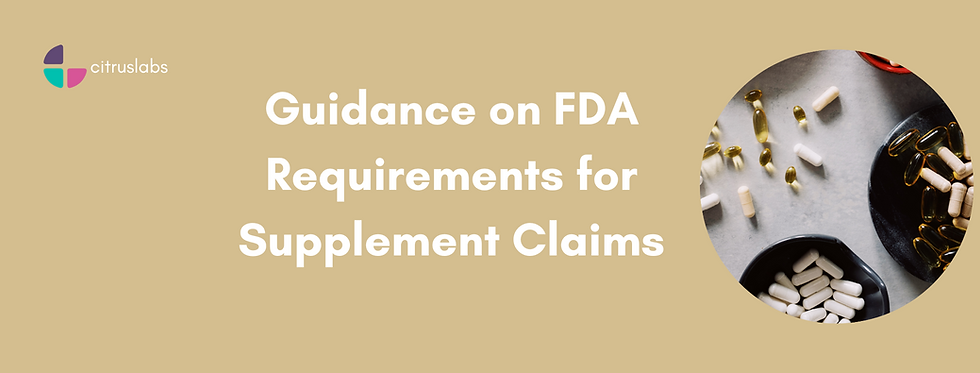Guidance on FDA Requirements for Supplement Claims
- Morgan Carpenter
- Jul 10, 2023
- 3 min read

There are various kinds of supplement product claims that supplement brands can create through clinical research. Several of these are specifically regulated by the FDA, including structure/function claims, general well-being claims, and nutrient deficiency claims. It is essential for brands to understand the different requirements associated with each kind of claim, as well as how best to approach them when presenting your brand’s clinical trial results.
FDA Pre-approval for Supplement Claims
Brands should note that the three types of claims regulated by the FDA do not qualify for pre-approval. Instead, you must provide evidence of the validity of your claim no later than 30 days after marketing your product. This means that it is vital to create product claims with clinical evidence supporting them in order to satisfy FDA regulatory requirements.
Supplement brands have historically made the mistake of creating vague or misleading product claims that aren’t backed up with any kind of evidence. This is in violation of both the FDA and the FTC’s guidance for supplement claim labeling. It is therefore essential for brands to conduct clinical trials or other forms of research, such as consumer perception studies, in order to support the claims associated with their formulas.
Structure/Function Claims
The first kind of supplement claims specifically regulated by the FDA are known as structure/function claims. These claims describe the way that a given ingredient or formula affects either a structure or a function of the body. For instance, structure claims may reference the way a vitamin supports strong bones, while function claims may describe how a formula improves digestion. By carefully crafting structure/function claims, brands can effectively communicate the specific benefits their products offer to consumers.
General Well-being Claims
Another type of claim that brands need to be aware of is general well-being claims. As the name suggests, these claims describe the overall benefit to health and well-being that an ingredient or formula may provide. An example of these claims may be found in the labeling of multi-purpose supplements designed to support health overall, rather than a specific symptom. When making general well-being claims, brands must ensure that their statements accurately reflect the potential benefits of their products without making unsubstantiated or exaggerated claims.
Nutrient Deficiency Disease Claims
While it is generally prohibited for supplements or vitamins to claim to treat or prevent any disease, there is an exception made for vitamin deficiency-related issues. However, there is an important distinction that brands should be aware of. Supplement brands can claim that a given nutrient will benefit those with a deficiency disease ONLY if they also highlight the prevalence of such a disease in the United States. This requirement ensures that claims related to nutrient deficiency diseases are grounded in factual information and provide necessary context to consumers.
Wrapping Up
Overall, supplement brands must exercise caution when making claims about their products and adhere to the regulations set forth by the FDA. By focusing on structure/function claims, general well-being claims, and nutrient deficiency disease claims (with the necessary context), brands can accurately convey the benefits of their products while meeting the rigorous standards of regulatory compliance.
Want to create your own clinical trial?
Citruslabs provides a simple and affordable way to prove that your products actually work. At Citruslabs, we design a clinical trial that is right for you and your budget, so you can start sharing research-backed product claims without spending a fortune. We offer the cohesive planning and management required to conduct successful clinical trials, from start to finish. Ready to get started? Let's talk! You can contact us here.



